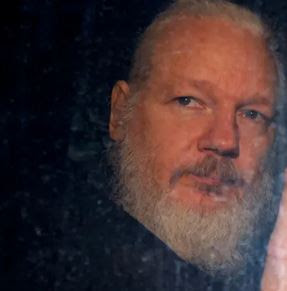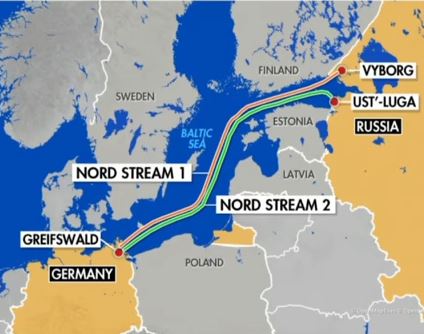BURIED ALIVE IN PLAIN SIGHT
 Whatever you may think of the man or his mission, this is a major story- a 21st century story- and a story you cannot afford to ignore. The face should be all too familiar. These photographs -taken only 15 years apart- illustrate, I believe, what a grim toll the world of journalism has taken upon Julian Assange.
Whatever you may think of the man or his mission, this is a major story- a 21st century story- and a story you cannot afford to ignore. The face should be all too familiar. These photographs -taken only 15 years apart- illustrate, I believe, what a grim toll the world of journalism has taken upon Julian Assange.Many of his supporters would disagree with this statement, I understand. Most would insist that the scars Julian bears are from wounds inflicted by the establishment, the elite, and the power-brokers - rather than by 'the world of journalism'. But I would reply -not unsympathetically- that this is a naive assumption. Because all four of the above are limbs of the same corrupt body.
Newspapers stink. Whatever your preferred mainstream rag, left, right or centre, I would urge readers to wise up, ditch that tattered loyalty and look elsewhere for their daily infotainment. Per my personal experiences of the formal media safari, I would describe the world of mainstream journalism as a primal, Darwinian jungle where Armani-clad predators come disguised as prey and the deadliest weapon is a headline.
And, as the man who launched Wikileaks has learned to his cost, trading in weapons is a very dangerous business. At precisely the point when online journalism dovetailed in importance with the printed word, Wikileaks was born. The rest is -a kind of- history.
Sympathy for the predicament of Julian Assange should come easily to the average Brit, now that
Lockdown UK has reduced very many of us -myself included- to bouts of frustrated rage and despair. Imagine then, a very personal lockdown that lasted a decade -custom built to ruin your specific life in particular- and you may step for a moment into the shoes of Julian Assange.
So who really is he? What crime has he really committed? Good questions, which -spoiler alert- I will not be answering today. Currently the most high-profile inmate in HMP Belmarsh, he is perhaps -depending on your viewpoint- a prisoner of conscience, a foolish troublemaker, a digital David chasing Goliaths, a martyr to terrible Truth or just a boat-rocking Enemy of the State.
Opinions of the curious Mr Assange tend (of course) to align with the politics of those holding forth on the subject. But, unusually in this age of fleeting celebrity, he retains a steady grip on the public's fickle attention. Pretty much everyone has an opinion, because his is an epic tale; on the face of it, a tragedy, albeit one without an end. As yet. With its international flavour and sprinkling of gratuitous (and utterly fictitious) sex-crime, it's exactly the kind of story the public devours -all jet-planes, celebrity supporters, terrible secrets revealed and some tits 'n bum offstage for the tabloid mongrels to chew on. The Wikileaks saga -too wildly dense to unravel in a single blogpost- is a logic-defying snake-pit of conflicts and confusions, with the only certainty being Assange's eventual place in the pantheon of activist folklore.
But this does not lessen the importance of his role in the rapidly-unfolding theatre of aggressive globalism to which we are being subjected. We are corralled in the era of information overload, and Wikileaks was -albeit briefly- at the tip of an important spear. Who was actually holding that spear, and whose side it may have pierced, remains to be seen. In a chaotic new century spawning legions of desktop warriors, if a Julian Assange hadn't existed, one would surely have been invented.
Wikileaks was an incident waiting to happen, once the process of elevating the 'leak-bearer' to iconic status was well-established. Watergate, anyone? An older generation of hero-seekers bought heavily into a Woodward/Bernstein myth that -if you believed it- brought down a uniquely corrupt American president by means of 'leaked information from mysterious secret sources'. The USA being what it is, the result was Pullitzer prizes all round and a guaranteed income for life for the lucky couple.
Yet that threadbare Watergate myth -like most modern legends- could not survive the passage of time and the fierce scrutiny to which it was (correctly) subjected. But the myth had served its purpose - and served up probably the best modern example of how the world of journalism could be exploited engineer a political earthquake - in the world's greatest superpower. It is, nevertheless, my sad duty to reiterate that the world of journalism was then, and remains, now and forever, irredeemably corrupt.
My own brief entanglements with Fleet Street quickly taught me that real journalism is an an activity, not a profession. Whatever reporters actually learn in their journalistic endeavours comes rapidly into conflict with what they will be allowed to report. There exists a long list of names you cannot name and tales you must never tell. Like a rotting cod slapped in your innocent face, each journalist discovers there is (a) a market for information, and (b) the devil is in the details. Then you make your choice - do you like journalism or your job? (I was never personally required to state that choice aloud, having delivered my decision in the form of a never-to-be-printed article that atomised my career in an instant).
Information is power, goes the cliche, but in journalistic reality, information behaves more like a bio-weapon, as the measure of its power to destroy is only revealed when it comes into contact with the public. Not surprising then, that there seems to be no definitive Wikileaks 'scoop' that brought the wrath of the political gods down upon its shoulders. I sincerely doubt that Julian Assange himself knows quite where or when his brilliantly-marketed operation went pear-shaped; whose cage was too loudly rattled. A wiser man might have cast his net a little more carefully - but Assange won't be the last fisherman yanked overboard by a Great White shark while hunting mackerel.
From a publicity perspective (and that is a perspective he well understands) it is Assange's bad luck that the gruesome reality of his solitary confinement in a Belmarsh prison cell has been eclipsed by the unending media obsession with the first annual Corona Carnival. Or perhaps the headline-monopolising arrival of the Killer Plague from Planet Bat supplies the excuse for his tormentors to shove awkward news onto page six. Coronapanic has undoubtedly permitted them to proceed with the cold, efficient process by which Julian Assange gets buried alive, slowly, in plain sight.
And here, I submit, is the point of the exercise. While the details are invariably memory-holed, it is standard practice for whistleblowers to be killed. Terence Yeakey and Kenneth Trentadue may not be familiar names in the UK, but both were murdered as a result of their attempts to expose the truth about the Oklahoma City bombing in 1995 -the worst terrorist atrocity in USA history until 911. Both died in transparently faked "suicides". We Brits have, however, no excuse for forgetting the equally preposterous "suicide" in 2003 of Dr David Kelly, who stood poised to wreck the official Iraq war narrative. In 2013, investigative journalist Michael Hastings died in an absurd "one car crash" which prevented him releasing a career-ending story about CIA director John Brennan. These are high-profile examples but the list really is endless.
In which context, Julian Assange is one of a trio of very loud, very visible 'whistleblowers' made conspicuous by their survival; Edward Snowden and Bradley (Chelsea) Manning being the other two.
 |
| ANYTHING TO SAY? |
In September of 2013 the Guardian newspaper published a lengthy hymn of praise titled Edward Snowden, Chelsea Manning and Julian Assange -our new heroes, written by the Slavoj Zizek, an extremely dodgy 'communist intellectual' whose CV reeks of espionage and globalist paychecks.
Eighteen months later, a quite remarkable statue of the three titled Anything To Say was unveileed in Berlin's Alexanderplatz,
Zizek and the sculptor Dormino may well be sincere and honest supporters of Julian Assange , but the actual consequences of their support include directing public attention into a conveniently narrow focus. Bear in mind that for all the thousands of articles and -above all- headlines generated by Wikileaks, not once did the world's most famed leaking hub reveal anything of substance that was not already in plain view.
There is also an uncomfortable unity of consistent support for all three to be found in the pages of the Guardian, New York Times and Washington Post, Die Welt in Germany and Paris Match in France. Time magazine -an even uglier globalist rag than those- has devoted acres of space to promoting Julian Assange and Wikileaks, while pretending to chide him (gently) for rocking the Obama boat.
It is a bitter pill that many refuse to swallow, but all the publications above are wholly corrupt organs of the State. Every word they print is crafted and calculated for its potential to enshrine the desired State narrative in the public consciousness. The same is true of all the other newspapers thrust at you in the newsagents and the train stations. News is a state-controlled industry and there are no trustworthy exceptions. If the state wished us to forget about Julian Assange, he would vanish from the media instantly.
The idea that any or all of these three globally-celebrated leakers are 'protected' by their notoriety is ill-judged. The opposite is true. Their very lives now depend entirely on the whims of the power-brokers who helped create and curate their output. Is anyone really naive enough to think Snowden and Manning could not have been "suicided" in their prisons? If Julian Assange had been found dead in the Ecuadorian Embassy or his cell in Belmarsh, would anyone really be surprised?
When the loathsome globalist blackmailer Jeffrey Epstein had outlived his usefulness he was dispatched with the confidence only tyranny can summon. It was a brazen, bold murder with not an ounce of finesse or even a credible cover story. Such is the nature of power, that the lowest criminals and the best-intentioned are prosecuted and dispatched with the same manipulative disdain.
It may yet be that Julian Assange can regain his freedom and rebuild some kind of life outside the matrix of intrigue into which he stumbled. If the happy-endings arranged for both Snowden and Manning are taken as pointers, this may well be the fate allotted to him. But the price of his freedom will be cooperation, and it remains to be seen just how cooperative he feels after a decade skewered to the tip of the whistleblower Christmas tree. It's a painful thought to embrace, but his continued presence in the media as a martyr to truth may be precisely what is desired. The British State pioneered the selective use of torture in the days when the Empire ruled the waves. Political prisoners were among those hung publicly at busy crossroads, to serve as visible warnings to anyone else tempted to challenge authority. Toujours la meme chose.
A large number of individuals and organisations are lobbying very heavily to secure the prompt release of the political prisoner Julian Assange. You can reach out to many of them through the world Press Freedom Day page by clicking the link HERE : FREE JULIAN ASSANGE






Comments
Post a Comment